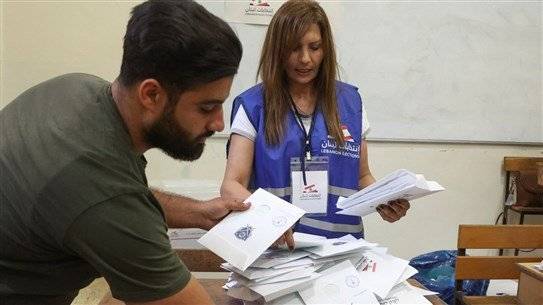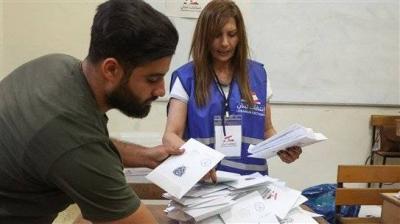In a corner in front of one of the polling stations in the Tariq al-Jdideh area, an Ethiopian girl is holding the hand of an elderly woman, staring at passersby and smiling. A crowd of "girls and young women wearing matching yellow T-shirts indicating their political affiliation" is nearby, while an electoral office for another candidate has its members taking a break at midday to eat ready-made sandwiches. Close to them, a young man is explaining on a ballot list he holds to an elderly woman where she should place her first and second marks. The guide here is the numbers: "Put a checkmark next to the top of the list and count one, two, three, and put a second mark."
In Tariq al-Jdideh, the stronghold of the Sunni community in Beirut II, shopkeepers, especially restaurant owners, did not comply with closing their shops. This was their opportunity for income during times of economic hardship. Elections here are measured, as in most areas, not by the candidate’s identity and program but rather by what they can provide to the voter. Here, votes were traded for the motor bill, school fees, and food coupons. This long election day served as a means of livelihood for many, more so than just expressing opinions in streets adorned with giant images of Future Movement leader Saad Hariri, complemented by a boycott message.
Voting rates inside some polling stations designated for the Sunni community in the Beirut II district, particularly in the Mina al-Hosn and Ras Beirut areas, reached about 11% before noon, according to the heads of the polling stations, and less than 8% in the other polling stations. The activity varied from one area to another in Beirut II; the electoral scene was absent in some parts but present in others with a heavy presence from projects, the Islamic Group, Hezbollah, Fuad Makhzoumi, and activists for the list of Nabil Badr, whose sports presence overshadowed political aspects in the elections, as the banners of the Ansar team dominated. Some Beirut-based associations were active for the list as it was known that some Future Movement cadres voted for Badr’s list and distributed preferential votes between him and the candidate Mahmoud al-Jamal, seen as a response to the list backed by President Fuad al-Siniora, which did not have a similar electoral presence as the Shiite lists and projects.
Beirut II was not an exception in terms of paying money to voters and covering their expenses for transport, fuel, and even sandwiches. A total of 85 candidates across nine electoral lists competed for 11 seats, divided between 2 Shiite seats, 6 Sunni seats, one Druze seat, one Orthodox seat, and another Evangelical seat. The day passed normally with no significant issues in the areas, exceeding the unofficial voter turnout rate in Beirut II by 31%, a figure that requires a detailed reading to understand the distribution of votes among communities and to grasp the level of participation, especially given the uncertainty regarding the distribution of voting percentages across the lists.
This district witnessed competition among the nine lists, with electoral machines producing vastly contradictory results, which do not hint at the final outcome expected to be announced in the coming two days. Politically, it has been proven that Beirut has not deviated from its commitments, keeping candidates in a state of anxiety throughout the election day, awaiting increased turnout. The long election day in Beirut II did not yield any exceptional events except for the notable absence of the Future Movement and its leader, despite their strong presence through images and slogans in areas with significant Sunni weight. Beirut II has a story to tell in the ballot box that may not reveal its features overnight. Tomorrow, many will celebrate the results of Beirut II simply by comparing them with the previous electoral round and claiming they have increased since the days of Hariri, while the truth will remain in the ballot box and will eventually be uncovered in the days to come.
Ghada Halawi - Nidaa al-Watan




